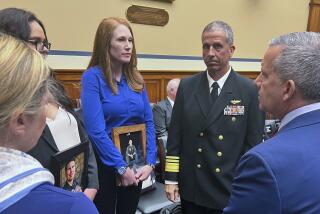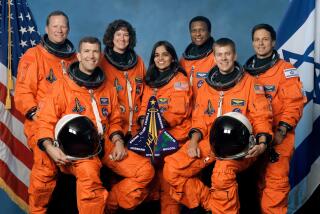Rep. Nelson Plans Shuttle Safety Inquiry
- Share via
WASHINGTON — A Florida congressman who flew aboard the space shuttle Columbia two months ago announced plans Thursday for a “fair but tough” investigation of shuttle flight safety, focusing on the Columbia launch that took place only 16 days before the Challenger disaster.
Rep. Bill Nelson (D-Fla.) said that his space science and applications subcommittee of the Science and Technology Committee will undertake the investigation because of indications that Columbia twice came close to being launched with problems that could have triggered a catastrophe.
The mission, with Nelson as a passenger, was postponed six times before it was finally launched on Jan. 12. Internal National Aeronautics and Space Administration memos that have surfaced in recent days revealed that on Jan. 6 and Jan. 7, the spacecraft came close to launch under conditions that could have led to fatal accidents.
Flight Safety Investigation
“This is obviously adequate reason for us, as a space committee, to get into the issue of flight safety,” Nelson said, promising that his committee’s investigation will not interfere with the work of the presidential commission charged with finding the probable cause of the Challenger accident.
A memorandum written by chief astronaut John W. Young earlier this month and published this week cited incidents in the shuttle program that could have led to destruction of the spacecraft and its crew.
In a stern warning to shuttle management officials, Young warned of the pressures to meet schedules and their effects on safety. “If we do not consider flight safety first all the time at all levels of NASA,” he said, “this machinery and this program will not make it. If the management system is not continuously self-assessing with respect to flight safety of the inherently hazardous business that we are in, it will not last.”
Liquid Oxygen Drained
Another memo, written by Arnold D. Aldridge, the No. 2 official in the shuttle program, revealed that a flight controller on Jan. 6 inadvertently opened a valve and drained 18,000 pounds of liquid oxygen from Columbia’s huge external fuel tank.
Five minutes before the planned liftoff, a balky valve caused an over-chilling of a main engine. In the process of solving that problem, the oxygen was accidentally dumped. But 31 seconds before liftoff, launch support crews at Marshall Space Flight Center called a hold because of the abnormal temperatures.
Had the launch taken place without sufficient oxygen in the tank, it could have led to a shutdown of the spacecraft’s main engines before it reached orbit.
On the following day, a launch attempt was abandoned because of unacceptable weather conditions at emergency landing sites. After the weather delay, however, it was discovered that an inadequate weld had failed in an oxygen line and that a critical valve might have failed at main engine cutoff, which engine experts said would have resulted in catastrophe.
Late April Hearings
Nelson said his subcommittee will begin the safety hearings as soon as deliberations on the NASA budget have been completed, probably in late April.
Although the congressmen said that the investigation will steer clear of matters before the presidential commission, the decision to launch a congressional inquiry is a sharp turnabout.
Rep. Don Fuqua (D-Fla.), the chairman of the Science and Technology Committee, told the House last month that it would not “enhance the investigative process to have members of Congress playing prosecuting attorney vis-a-vis the commission or NASA while we have such an incomplete picture.”
More to Read
Sign up for Essential California
The most important California stories and recommendations in your inbox every morning.
You may occasionally receive promotional content from the Los Angeles Times.













